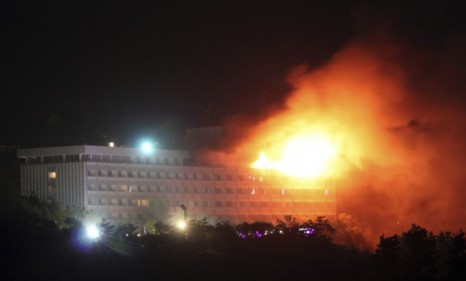Afghanistan's 'Mumbai-esque' hotel attack: 3 lessons
A Taliban suicide squad stages a daring attack on a heavily guarded hotel in the Afghan capital. What does this say about America's longest war?

A free daily email with the biggest news stories of the day – and the best features from TheWeek.com
You are now subscribed
Your newsletter sign-up was successful
On Tuesday, eight armed members of the Taliban attacked the historic Intercontinental Hotel in Kabul, where a meeting of Afghanistan's provincial governors was to take place the next day. The attackers killed at least 11 people, including five hotel workers and three Afghan policemen, and were only stopped when two NATO helicopter gunships killed three insurgents staging a last stand on the hotel's roof. Some of the attackers had blown themselves up with suicide bombs during the hours-long attack. The Intercontinental is one of the Afghan capital's best-known and best-protected landmarks, and popular with journalists and foreigners. Here, three things this daring attack says about the war:
1. The Taliban are still a threat, even in Kabul
This "Mumbai-esque" attack on a symbolic and "heavily guarded tourist spot" — instead of some far-flung military outpost — sends a clear message to NATO commanders, says Ed Morrissey at Hot Air. "The battlefield this year might be a lot bigger than they think." The Taliban's timing — right after President Obama's withdrawal announcement — was meant to "show that not only haven't they been defeated, they're still strong enough to wreak havoc right under NATO's nose."
The Week
Escape your echo chamber. Get the facts behind the news, plus analysis from multiple perspectives.

Sign up for The Week's Free Newsletters
From our morning news briefing to a weekly Good News Newsletter, get the best of The Week delivered directly to your inbox.
From our morning news briefing to a weekly Good News Newsletter, get the best of The Week delivered directly to your inbox.
2. Afghan soldiers can do the job, with NATO's help
The Taliban were looking to "undermine confidence in the upcoming handover of security from international to Afghan forces," say Ben Arnoldy and Zubair Babakarkhail in The Christian Science Monitor. But they might have done the opposite. This was a test of the post-handover strategy of "putting Afghans on the front line, embedding trainers with those units, and calling for help when needed." And though the Taliban initially succeeded in penetrating the hotel's defenses, in the end, the NATO-backed Afghan forces prevailed, dispatching the Taliban with relative speed and skill.
3. Military victory won't mean total victory
The war has entered a new phase, says K.T. McFarland at Fox News. As Gen. David Petraeus warned, now that military targets are beyond the Taliban's reach, they've moved on to soft targets like this Kabul hotel. No matter how many victories we win on the battlefield, there's no guarantee President Hamid Karzai will "be able to hold the country together once we leave." So if "we cannot fight our way out of Afghanistan," maybe it's time to start trying to negotiate our way out.
A free daily email with the biggest news stories of the day – and the best features from TheWeek.com
-
 Political cartoons for February 14
Political cartoons for February 14Cartoons Saturday's political cartoons include a Valentine's grift, Hillary on the hook, and more
-
 Tourangelle-style pork with prunes recipe
Tourangelle-style pork with prunes recipeThe Week Recommends This traditional, rustic dish is a French classic
-
 The Epstein files: glimpses of a deeply disturbing world
The Epstein files: glimpses of a deeply disturbing worldIn the Spotlight Trove of released documents paint a picture of depravity and privilege in which men hold the cards, and women are powerless or peripheral